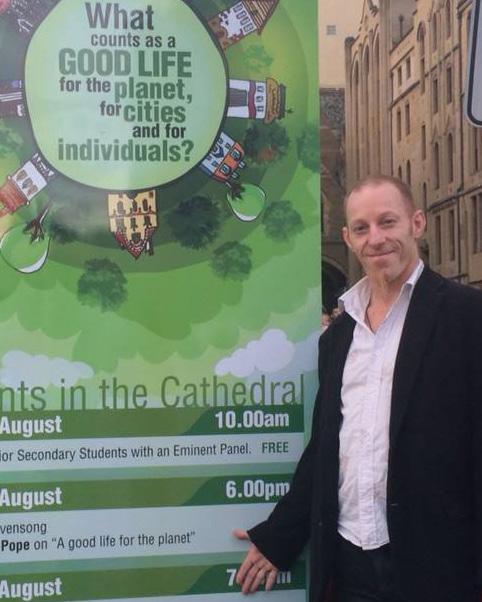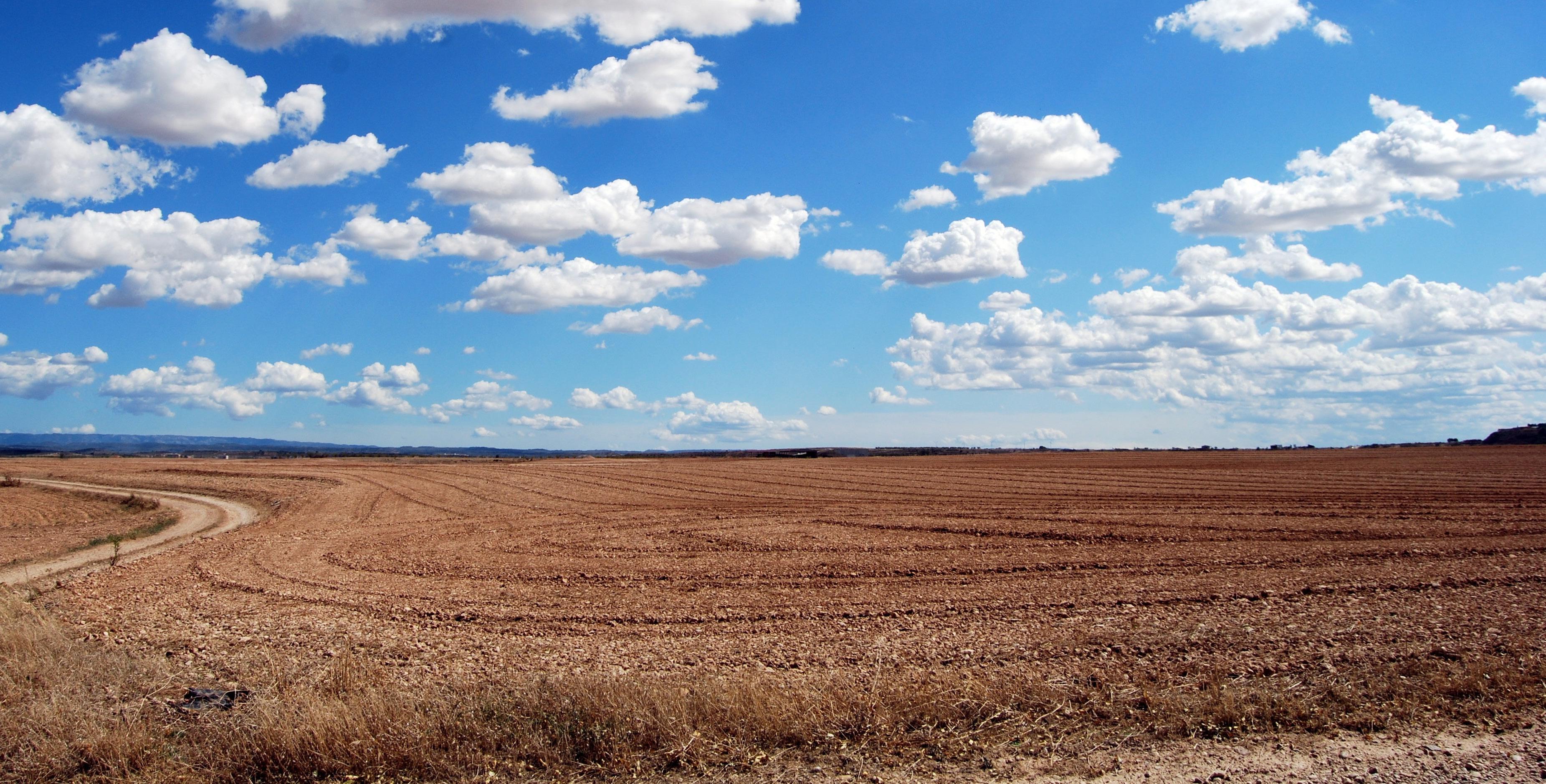
9 minute read
In the beginning - renewal
While I am a city boy at heart, most of my formative years were spent in country Victoria, the Goulburn Valley. We weren’t famers, but often rented houses on farmland. I woke up to the sound of cows pulling at grass, smelled their dung. I swam in irrigation channels and climbed trees. I watched green grass turn into hay. My attempts at hay bailing were mixed. Life on the land gives you a better sense of the cycle of renewal, although urbanites get a taste with the seasonal dive bombings of magpies.
Growing up and moving away to university was the beginning of a long journey to faith – a spiritual renewal – and beyond to integrating aspects of my life with that. As someone who had always had an interest with nature – now creation – I have tried to understand how the bible tells us how we are to understand our relationship to the natural world. This includes how we harness it for our food. Having a PhD in meteorology means that must involve understanding climate change through a Christian lens. This in turn drove me to a Masters degree in theology, reading Genesis 1–3 and its relationship to other parts of the Pentateuch (first five books of the bible).
To get the maximum value out of Genesis 1, we need to leave the origins wars behind, and try and go back to when it was written. It is then we obtain value for an agricultural setting. The first clue is that the earth is described as a “formless void” in verse 2. The two Hebrew words translated here tohu and bohu, are used elsewhere in an agricultural setting. In Isaiah 34, the rulers of Edom are judged for their hostility to Israel and their land is consequently destroyed. We can see how judgment on Edom’s rulers is central, but that the impacts are felt by the land itself, by laying out verses 11–17 as follows:
Dr Mick Pope Professor of Environmental Mission
11a the land of Edom will be occupied by wild animals 11b the land becomes desolate (tohu) and empty (bohu), unfit for agriculture 12 human rulers will be nothing 13a the land will be full of weeds, signs of agricultural collapse 13b–17 the land will be occupied by wild animals.
You can see how the passage forms a chiasm, named after the Greek letter X. (Chi - C c) The central idea is in the middle, that the rulers of Edom are being judged. The same words used in Genesis 1:2 is paralleled to agricultural collapse.
So how does Genesis 1 establish agriculture, and how is it related to renewal?
On day one, light is created and separated from darkness to form day and night. This is the creation of time. Space is created on day two, by the separation of the waters above from the waters below by the firmament. On the third day, food is created by separating the waters into one place and the dry ground in another where vegetation can grow. From the earth comes forth sprout–¬out sprouts, plants seeding seed, and fruit trees bearing fruit. There is an emphasis on self–-perpetuation and abundance, together with provision for human and animal consumption. Interestingly, the provision of plants for animal consumption in Gen 1:29–30 points beyond the human ordering of agriculture. Instead, we see divine providential care for all creatures, and that human agricultural activity has appropriate bounds, seen also in the blessing to be fruitful and multiply to both humans and non-humans (Gen 1:28 c.f. v.22). Human use of the planet dominates that of all other creatures. This can be seen of the abrogation of non-human creature’s right to food.
On day four, the sun, moon, and stars are created. These mark out the seasons (v.14), but that doesn’t mean simply the four seasons of the climate. In Leviticus 23, the feasts of the Lord (v.2) include the Sabbath and the seven annual feasts of Passover, Festival of Unleavened Bread, First Fruits, Festival of Weeks (Pentecost), Festival of Trumpets, Day of Atonement, and Tabernacles. Each of these feasts occurs in either spring or autumn and is tied to agricultural activity. In this respect, Genesis 1 points to agricultural festivals.
On day five, the blessing to be fruitful and multiply is given to the birds and fish. On day six, food is provided for land animals and humans. Eating plants that yield seed, the command to subdue the earth is best seen as agricultural activity. To have dominion does not mean to dominate, lest this robs animals of their food.
Over the top of all of this is the Sabbath. Eight acts of creation are forced into six days of creation. The pinnacle of the creation account is not – as important as the creation of humans and the granting of dominion is – in vv. 26–28. Instead, the first creation story ends in Genesis 2:1–3. No command to keep the Sabbath is given, but the seventh day is blessed – the same word used for the procreation of fish, birds, and humans – and declared holy. Sabbath rest is inclusive of all of creation. It marks its weekly renewal.
The theme of Sabbath is picked up in the book of Leviticus and is attached to agriculture. Chapter 23 indicates that Sabbath is associated with complete rest, and that several festivals of the Lord are also occasions of complete rest. Sabbath obedience is central to Israelite holiness, a deliberate echo of Genesis 2:3. In Leviticus 19:2–3, holiness is imitative of God, and revering parents and keeping the Sabbath is how it is done. Likewise, keeping the Sabbath reverencing the sanctuary bookends what is known as the Holiness Code in Leviticus (19:30; 26:2).
Keeping the Sabbath is not simply religious duty in ways in which we might understand, not playing sport and going to church on Sundays. Thinking back to the days of no Sunday trading brings us closer, the recognition of divine limits on human economic activity. The book of Leviticus also draws out the need for the land to experience rest and renewal. We see this in chapter 25. In the Sabbath year, the land is to observe a Sabbath for the Lord (v.2). There is a sense in which the land is to actively participate in its own rest and renewal. The Israelites had the responsibility to keep Sabbath and permit the land to enjoy this rest (v.4).
Letting the land enjoy rest and renewal in the Sabbath recognises the tight connection between the creation of the world and the creation of Israel. Leviticus stresses the divine ownership of the land over any Israelite claim (Lev 25:23). Creation of the earth by God precedes that of humans just as the Lord has a prior relationship with the land before the arrival of Israel. Humans as the divine image bearers are blessed to multiply, to subdue the land (for agriculture) and have dominion (Gen 1:26–30). Just as the earth and humans were to enjoy the blessings of Sabbath, so the Israelites and the land are to enjoy the Sabbath.

Given the land did not belong to Israel, Israel’s enjoyment of the land is contingent on obedience. Leviticus 26 indicates that seasonal rains and the harvest that follows on from them depended on faithfully following the commandments, particularly those regarding temple and Sabbath (vv. 1–13). The alternative was no rain, poor harvests, and eventually exile. Exile could in turn act as a renewal for the land. While Israel is in exile in the land of its enemies, the land shall enjoy its Sabbaths, making up for the times it did not rest on the Sabbaths of the Israelites (Lev 26:34–35). Failure to care for agricultural lands comes at a cost. Given that Sabbath is an expression of Israel’s holiness, and Sabbath keeping was for humans and the land, caring well for the land was itself an act of holiness. Being a covenant people, Israel knew no abstractions, but its spiritual experiences were tied to daily life, which was agrarian and in community with the other–than–human.
How does this relate to us in twenty first century Australia? While our society has Christian roots, we are far from ancient Israel as a covenant people. Genesis 1 still applies. Dominion is not domination. Sacred time still applies to humans, animals, and the land itself. Christians can still acknowledge that rest and renewal is both divine blessing and human responsibility.
With a recent report of the Intergovernmental Panel on Climate Change, we have evidence beyond any reasonable doubt that the climate is changing, and that humans are responsible. Whether you believe God allows this, or wills this, it comes because of human sin and misrule – a lack of granting the earth rest. In 2018, Verity Morgan-Schmidt is the CEO of Farmers for Climate Action noted that:
“My family has been on properties out in Western Australia for over 100 years. We can say this has well and truly moved beyond natural cyclical patterns. The idea that we could be accused of playing politics by accepting reality is a bitter pill to swallow. The science is clear. Climate change is increasing the severity of extreme weather events that include drought.”1
How then should we respond? Practical theologian Ellen Davis sees Genesis 1 as a liturgical poem of creation.2 Poems typically have rhythm, and in Genesis 1 this is “God saw … and it was good.” Goodness is a divine perception, and Davis believes that this represents a contemplative strategy for Israel and for us to see the world in the same way. Such contemplation requires use to change our minds, or metanoia, otherwise usually understood as repent.3
1 Lisa Cox, “Farmers challenge Nationals’ claim drought unrelated to climate change,” The Guardian, 11 June, 2018, accessed 6 June, 2018, https://www.theguardian.com/environment/2018/jun/06/national-partycomments-on-drought-and-climate-a-disservice-to-farmers. 2 Ellen F. Davis, Scripture, Culture, and Agriculture (Cambridge: Cambridge University Press, 2009), 42. 3 Davis, Scripture, Culture, and Agriculture, 46.
One more aspect about Genesis 1 is worth noting. Written in an age where other gods fought against each other to bring creation into being. In the Babylonian creation myth, the storm god Marduk conquered the personification of saltwater Tiamat, the many headed dragon. Out of her corpse he formed heaven and earth. Genesis 1 is a response to this. The chaos of the deep (where the Hebrew Tehom is linguistically related to Tiamat) is not a god. Instead, God conquers the forces of chaos to separate heaven and earth. The world around us is not the result of violence, but the loving provision of foods for all creatures.
Violence may not characterise creation, but it fills the earth (Gen 6:11) and the Flood reverses the victory of creation – the earth is covered in the deep once more. Quoting that God promised not to repeat act of uncreation is not an argument against sea level rise, where some of, but far from all the earth will be flooded. Chaos is released anytime humans are violent, whether that violence is against each other or the earth. Yet our God is a God of peace, and so peace is coming to all creation. In Revelation 21, God declares all things are being made new – a new Sabbath is coming for all things.
We need to practice Sabbath renewal for all things now. This isn’t an inflexible idea. Cows need to be milked on Sunday. I used to write weather forecasts on Sunday. The Sabbath is for doing good (Matt 12:12). The Sabbath was made for us, not vice versa (Mark 2:27). However, our rededication to rest and renewal for all will mean repentance as Davis observes.
Read Genesis 1:1–2:3 as a prayer of praise and repentance, and enter into God’s rest.








